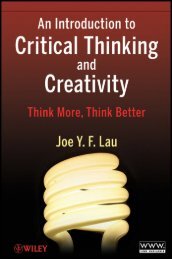A Selective Study in Post-Colonial Bengali Cinema - always yours
A Selective Study in Post-Colonial Bengali Cinema - always yours
A Selective Study in Post-Colonial Bengali Cinema - always yours
You also want an ePaper? Increase the reach of your titles
YUMPU automatically turns print PDFs into web optimized ePapers that Google loves.
29|Journal of <strong>Bengali</strong> Studies, Vol. 1, No. 2<br />
One significant question is, is there a s<strong>in</strong>gle mention of Hiralal Sen <strong>in</strong> the works of Satyajit Ray and<br />
Ritwik Ghatak? I failed to f<strong>in</strong>d any such mention <strong>in</strong> Satyajit's Bishoy Cholochchitro, Our Films<br />
Their Films and Ritwik Ghatak's Cholochchitro Manush ebong Aro Kichu (which is a complete<br />
collection of his writ<strong>in</strong>gs about c<strong>in</strong>ema, posthumously published). Most <strong>Bengali</strong>s themselves have<br />
been conveniently ignorant of the fact that Hiralal Sen was the first film-maker not just <strong>in</strong> Bengal<br />
but <strong>in</strong> India, as is noted by Kalish Mukhopadhyay (375-383), who worked relentlessly to establish<br />
this long forgotten fact of history among a people that found a pervert pleasure <strong>in</strong> its amnesia of its<br />
glorious past. Our film history is <strong>in</strong> a sorry state, and our acqua<strong>in</strong>tance with our past is abysmal,<br />
thanks to the relentless efforts of the 'progressives'.<br />
There are certa<strong>in</strong> dom<strong>in</strong>ant tropes of the communist version of our c<strong>in</strong>ema history which are<br />
repeated to the po<strong>in</strong>t of be<strong>in</strong>g cliché s<strong>in</strong>ce the communists took over <strong>Bengali</strong> <strong>in</strong>telligentsia: the precommunistic<br />
c<strong>in</strong>ema of the past was generally unregenerate, as opposed to the chosen proletarian<br />
art approved by the Party that will one day occupy the world, accord<strong>in</strong>g to the Marxist telos. It was<br />
reactionary, not revolutionary, avant-garde and experimental, like the c<strong>in</strong>ema made by the<br />
progressive left-oriented film-makers. It was star-centric, <strong>in</strong>dividualist and profit-motivated, as<br />
opposed to the true collective art of people's c<strong>in</strong>ema. It was theatrical and full of overact<strong>in</strong>g, as<br />
opposed to the anti-professional doctr<strong>in</strong>es of neo-realist c<strong>in</strong>ema which believed with a a puritan<br />
zealotry <strong>in</strong> the non-actors' ability to depict the truth of life.<br />
Sadly, like most of the left-liberal clichés , the progressive fetish aga<strong>in</strong>st professional actors<br />
too turns out to be hollow. Satyajit Ray recalls an <strong>in</strong>cident where an admirer of his film (named Mrs<br />
Flaherty, who was the wife of renowned director Robert Flaherty) <strong>in</strong> United States refused to<br />
believe that there were professional actors – and not rustic villagers – <strong>in</strong> Pather Panchali (Our<br />
Films Their Films 55-56). There was an <strong>in</strong>terest<strong>in</strong>g encounter between Ritwik Ghatak and Chhabi<br />
Biswas (the former was direct<strong>in</strong>g the latter <strong>in</strong> a film titled Koto Ojanare that never got f<strong>in</strong>ished and<br />
released) where Ritwik began as sceptical of Chhabi's professional brand of act<strong>in</strong>g and after a day's

















